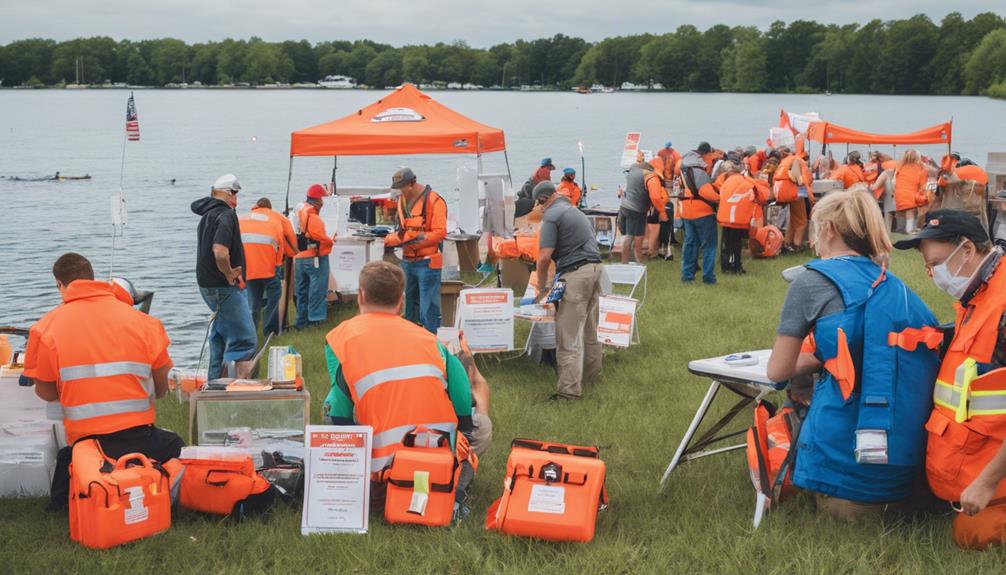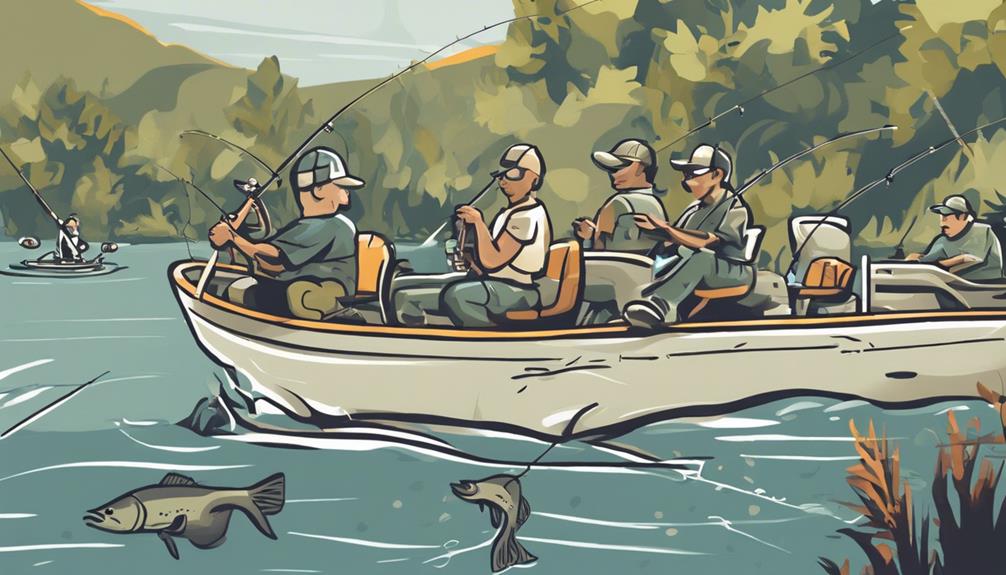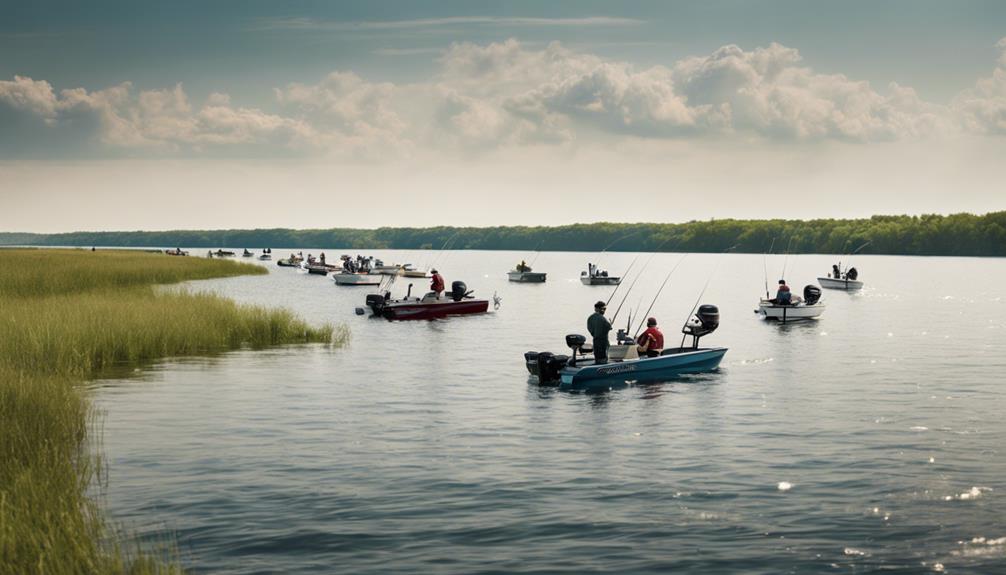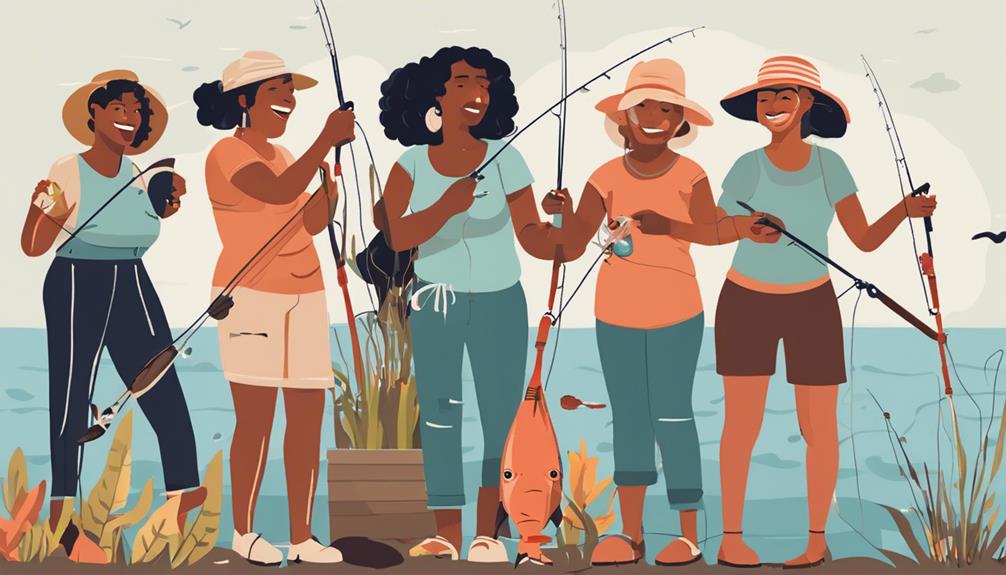To efficiently organize a fishing tournament, start by defining clear goals and breaking them into tasks. Secure permits, choose a suitable venue with amenities, and recruit sponsors and participants strategically. Simplify registration, offer incentives, and market the event effectively. Organize equipment, ensure safety measures, and manage logistics proficiently. Prioritize participant safety with thorough planning, medical support, and emergency protocols. Communicate openly and review safety regularly for a successful event. If you follow these steps, your fishing tournament will be well on its way to a smooth and enjoyable experience for all involved.”
Setting Tournament Goals
When organizing fishing tournaments, it's crucial to clearly define and set specific goals to ensure a successful and purposeful event. Goal setting strategies are fundamental in guiding the planning process towards achieving desired outcomes. To begin, establish clear tournament objectives that outline what you aim to accomplish. Whether it's promoting conservation efforts, raising funds for a cause, or simply providing anglers with a competitive platform, defining these goals will shape the entire event.
Effective planning techniques are essential for setting achievable tournament goals. Start by breaking down overarching objectives into smaller, manageable tasks. This approach allows you to create a roadmap with actionable steps to reach your desired outcomes. Consider establishing event milestones to track progress and make necessary adjustments along the way. By setting measurable targets, such as participant registration numbers or sponsorship goals, you can monitor the success of your event planning efforts.
Furthermore, aligning tournament goals with the interests and expectations of participants is key to ensuring a memorable experience for all involved. Surveying past participants or conducting market research can provide valuable insights into what attendees value most in a fishing tournament. By incorporating these preferences into your goal-setting process, you can tailor the event to meet the needs and desires of your target audience effectively.
Securing Permits and Licenses
To ensure the smooth execution of your fishing tournament, it's imperative to secure all necessary permits and licenses beforehand. Understanding the permit requirements and application process is crucial.
Begin by researching the specific permits needed for your tournament. This may include permits for fishing, boating, or using certain waterways. Once you have identified the necessary permits, carefully review the application process. Make sure to complete all paperwork accurately and submit it within the required timeframe to avoid any delays.
In addition to permits, familiarize yourself with licensing regulations and restrictions. Depending on the location of your tournament, participants may need to obtain fishing licenses. Check with local authorities to determine if there are any specific requirements for anglers.
Moreover, be aware of any restrictions that may impact your tournament, such as size limits for fish or designated fishing zones. By understanding and adhering to licensing regulations and restrictions, you can ensure that your tournament runs smoothly and complies with all necessary laws.
Securing permits and licenses may seem like a tedious task, but it's a critical step in organizing a successful fishing tournament. By staying organized and proactive in obtaining the required permits and licenses, you can set a solid foundation for a well-executed event.
Choosing the Right Venue
Researching potential venues that align with your tournament's requirements and participant needs sets the stage for a successful fishing event. When it comes to venue selection, consider the amenities available at each location. Look for venues that offer facilities such as docks or piers for easy access to the water, ample parking space for participants, and perhaps even a weigh-in station for the tournament. These amenities can enhance the overall experience for both participants and spectators.
The location of the venue is crucial in ensuring convenience for all involved. Choose a venue that's easily accessible, preferably with good road connections and clear signage to guide participants. Additionally, consider the accommodations available nearby. Participants may appreciate having lodging options close to the venue, whether it's hotels, campgrounds, or rental cabins. Access to restaurants and stores for any last-minute needs can also contribute to a positive experience for everyone attending the tournament.
Furthermore, assess the size of the venue in relation to the expected number of participants. Ensure that the venue can comfortably accommodate all participants without feeling overcrowded. A spacious venue not only provides a better experience for participants but also allows for smoother event logistics. By carefully considering these factors in your venue selection process, you can set the foundation for a well-organized and successful fishing tournament.
Recruiting Sponsors and Participants
Consider leveraging strategic partnerships to secure sponsors and attract participants for your fishing tournament. When it comes to recruiting sponsors and participants, you must employ effective sponsorship strategies and outreach efforts to ensure the success of your event.
Here are some key points to keep in mind:
- Sponsorship Strategies: Reach out to local businesses, fishing equipment manufacturers, and outdoor retailers to secure sponsorships. Offer different sponsorship levels with varying benefits to entice potential sponsors. Highlight how sponsoring your tournament can provide them with exposure to a targeted audience of fishing enthusiasts.
- Participant Registration: Make the registration process simple and convenient for participants. Utilize online registration platforms to streamline the sign-up process. Offer early bird discounts or special perks for those who register early to incentivize prompt registration. Provide clear instructions and information about the tournament rules and schedule to ensure participants are well-informed.
- Marketing Tactics: Utilize social media platforms, local newspapers, and fishing forums to promote your tournament. Create visually appealing posters and flyers to distribute in popular fishing spots and bait shops. Collaborate with fishing influencers or local fishing clubs to help spread the word about your event.
Promoting the Tournament
Begin by outlining a comprehensive marketing plan that includes targeted strategies to promote your fishing tournament effectively. Utilize social media outreach and email campaigns to create buzz and engage with potential participants. Platforms like Facebook, Instagram, and Twitter can help reach a wider audience and generate interest. Consider running contests or sharing sneak peeks to attract attention and encourage sharing among fishing enthusiasts.
In addition to online efforts, focus on establishing local partnerships and engaging with the community. Collaborate with fishing clubs, outdoor stores, and local businesses to spread the word about your tournament. They can help promote the event to their customers and members, expanding your reach within the community. Offering exclusive deals or discounts to their patrons can incentivize participation and foster a sense of community support.
Create engaging content that highlights the unique aspects of your fishing tournament, such as the location, prizes, or special guests. Leverage visual content like videos and photos to showcase the excitement and camaraderie of the event. Encourage participants to share their own fishing stories or experiences leading up to the tournament to build anticipation and create a sense of community around the event.
Organizing Equipment and Supplies
To ensure a successful fishing tournament, meticulously plan and organize the necessary equipment and supplies to facilitate smooth operations and enhance the overall participant experience. When it comes to organizing equipment and supplies, attention to detail is crucial.
- Regular Equipment Maintenance: Proper maintenance of fishing equipment such as rods, reels, and lines is essential to ensure they're in optimal working condition. Schedule routine checks and repairs to avoid any last-minute issues during the tournament.
- Supply Inventory Management: Keep a detailed inventory of all supplies needed for the tournament, including bait, lures, hooks, and other essentials. Ensure an adequate supply of each item and restock as needed to prevent shortages.
- Emergency Equipment Preparedness: In addition to the basic equipment, always have emergency supplies on hand. This includes items like first aid kits, extra life jackets, and emergency communication devices to handle any unforeseen situations.
Implementing Safety Measures

When ensuring the safety of participants in a fishing tournament, meticulous planning is essential to implement effective safety measures. Start by establishing clear emergency protocols that detail what actions need to be taken in case of unforeseen incidents. These protocols should cover a range of scenarios such as medical emergencies, severe weather conditions, or accidents on the water.
Conduct thorough safety briefings before the tournament begins to ensure that all participants are aware of potential risks and the safety procedures in place. Emphasize the importance of following guidelines, wearing appropriate safety gear, and respecting boundaries to prevent accidents. Encourage open participant communication so that any concerns or issues can be addressed promptly.
Having medical support readily available is crucial. Ensure that there are trained medical personnel on-site or a plan in place for swift medical assistance if needed. All participants should know how to access medical support during the tournament.
Regularly review and update safety measures based on feedback from past tournaments and any new guidelines or regulations. By prioritizing safety through detailed planning, effective communication, and access to medical support, you can create a secure environment for participants in the fishing tournament.
Managing Tournament Logistics
How can you efficiently coordinate the logistics of the fishing tournament to ensure smooth operations and participant satisfaction? Managing tournament logistics is crucial for the success of your event. Here are some key aspects to focus on:
- Registration Process: Simplify the registration process by utilizing online registration platforms. This will make it easier for participants to sign up, pay fees, and provide necessary information. Ensure that the registration deadline is clearly communicated to avoid last-minute hassles.
- Tournament Timeline: Develop a detailed tournament timeline that includes key events such as check-in times, fishing hours, and weigh-in deadlines. Communicate this timeline to participants well in advance to help them plan their day effectively. Flexibility is key, but having a structured timeline ensures smooth operations.
- Volunteer Coordination: Recruit and organize volunteers to assist with various tasks such as registration, scorekeeping, and event coordination. Clearly define roles and responsibilities, provide training if needed, and ensure effective communication channels are in place. Volunteers play a crucial role in the success of the tournament.
Efficiently managing these logistics will contribute to a well-organized fishing tournament. Additionally, don't forget to plan for the awards ceremony, ensuring that winners are recognized and prizes are distributed promptly. By paying attention to these details, you can enhance the overall experience for both participants and volunteers.
Frequently Asked Questions
How Can Weather Conditions Impact the Success of a Fishing Tournament?
Weather conditions can greatly impact the success of a fishing tournament. Unfavorable weather like strong winds or heavy rain can disrupt fishing strategies and make it harder to catch fish.
Fish tend to react differently to changing weather, affecting their behavior and location. Anglers need to adapt quickly to these conditions by adjusting their techniques and equipment to increase their chances of a successful catch.
Paying close attention to the weather forecast is crucial for planning a successful tournament.
What Are Some Creative Ways to Engage Spectators During the Tournament?
To engage spectators during the tournament, consider interactive activities like casting competitions or knot-tying workshops. Utilize social media to create buzz, share live updates, and host online contests.
Encourage attendees to participate in fun challenges or photo contests for prizes. By offering engaging experiences and fostering a sense of community through social media engagement, you can enhance the overall excitement and involvement of spectators at the fishing tournament.
Is There a Limit on the Number of Participants Allowed in the Tournament?
There may be participant restrictions in place for the tournament. Check the registration process details for any limitations on the number of participants allowed.
Ensure you understand these rules clearly before signing up to avoid any issues. Keep an eye out for announcements or guidelines regarding participant limits to stay informed.
Being aware of any restrictions can help you plan and prepare effectively for the tournament.
How Do You Handle Emergencies or Unexpected Situations During the Event?
During your event, unexpected situations may arise, requiring efficient crisis management. Implement clear emergency protocols and communication strategies beforehand.
Designate a team to handle emergencies and ensure quick response times. Communicate with participants about safety procedures and emergency contacts.
Stay organized and ready to address any issues that may arise. By having a well-thought-out plan, you can effectively handle emergencies and maintain a safe environment during the tournament.
Are There Any Specific Rules or Guidelines Regarding Catch-And-Release Practices?
When it comes to catch-and-release practices, it's crucial to follow catch and release ethics and conservation practices. Ensure anglers handle fish with care, use proper gear to minimize harm, and release fish gently back into the water.
Emphasize the importance of protecting fish populations for future generations. Educate participants on best practices to ensure the sustainability of fish species.
Conclusion
In conclusion, by following these efficient steps to successfully organize fishing tournaments, you can ensure a smooth and enjoyable event for all participants.
Setting clear goals, securing permits, choosing the right venue, recruiting sponsors and participants, promoting the tournament, organizing equipment and supplies, implementing safety measures, and managing logistics are all crucial components to a well-run tournament.
By staying organized and strategic throughout the planning process, you can increase the likelihood of a successful and memorable fishing tournament.



